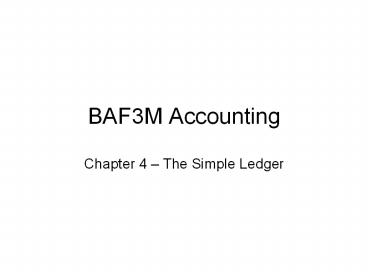BAF3M%20Accounting - PowerPoint PPT Presentation
Title:
BAF3M%20Accounting
Description:
... if the debits equal the credits OUT ... NO BAF3M Accounting ... accounts have CREDIT values 4.2 Debit and Credit Theory Rules of Debit and Credit ... – PowerPoint PPT presentation
Number of Views:185
Avg rating:3.0/5.0
Title: BAF3M%20Accounting
1
BAF3M Accounting
- Chapter 4 The Simple Ledger
2
4.1 Ledger Accounts
- First off, some key distinctions
- An Account is a page designed to record the
changes for an individual item - A Ledger is a group or file of accounts
- Heath Ledger is a late actor best known for
playing The Joker in The Dark Knight
3
4.1 Ledger Accounts
- There are many ways to create a ledger
- In real world would be computerized
- In class we will use paper to learn the
accounting theory - Each item (account) on the B/S has its own page
in the ledger (p. 89) - Use T-Accounts for this
4
4.1 Ledger Accounts
- T accounts
- Called so because they look like a T
- leftTright
Account name
5
4.1 Ledger Accounts
- Its key to understand what side of the ledger
the beginning balance is on - ASSETS ? LEFT
- LIABILITIES OE ? RIGHT
6
4.1 Ledger Accounts
- To Do
- 1) Copy the T account relationship on page 90.
- Do Exercises 1, 2
- Well do 3 together
- Do Exercise 4
7
4.2 Debit and Credit Theory
- Debit (DR) ? LEFT SIDE
- Credit (CR) ? RIGHT SIDE
- Asset accounts have DEBIT values
- Liab OE accounts have CREDIT values
8
4.2 Debit and Credit Theory
- Rules of Debit and Credit
- For each type of account, record increases on its
beginning value side and decrease on the other
side - EX. ASSETS ? increases left -- debit
- ? decreases right --
credit
9
4.2 Debit and Credit Theory
Types of Accounts Beginning Value Side Increases Decreases
ASSET accounts LEFT DEBIT CREDIT
LIABILITY OWNERS EQUITY accounts RIGHT CREDIT DEBIT
10
4.2 Debit and Credit Theory
- Memorize this
- ASSETS LIABILITIES
OWNERS EQUITY - - - -
- DR CR DR CR DR CR
Follow along with scenario on pgs 94 - 100
11
4.2 Debit and Credit Theory
- TO DO
- 4.2 Questions 1 6, 9 11 pg 102
- 4.2 Exercises 1 4 Pg 102-4
12
4.3 Account Balances and Terminology
- Calculating the Balance of an account
- 2 steps
- Step 1 Add the two sides separately (your totals
are called pin totals or pencil footings) - Step 2 Subtract the smaller total from the
larger total, write the result beneath the larger
number and circle it - See Example Figure 4.6 p. 94
13
4.3 Account Balances and Terminology
- Interpreting the Balance of an Account
- Exceptional Account Balances
- The Bank Account
- Buying Selling on Credit
- Read each section (p.94) and make your own notes
14
WHY DO WE DO A TRIAL BALANCE?
4.4 Trial Balance
- Periodically it is necessary to check the
accuracy of the ledger (your T-accounts) - To do this we use a form called a TRIAL BALANCE
15
WHAT IS A TRIAL BALANCE?
4.4 Trial Balance
- TRIAL BALANCE - is simply the listing of the
account balances in a ledger - it is used to see if the dollar value of the
accounts with debit balances is equal to the
dollar value of the accounts with credit balances
16
KEY TERMS
4.4 Trial Balance
- IN BALANCE if the debits equal the credits
- OUT OF BALANCE if the debits dont equal the
credits
17
STEPS TO CREATE A TRIAL BALANCE
- Include the heading (who, what, when)
- List all the accounts and their balances.
- Place the debit balances in a debit column and
the credit balances in a credit column. - Add up the 2 columns.
- See if the 2 column totals are the same.
18
Trial Balance Example
19
(No Transcript)
20
If the 2 columns balance does that mean I did it
right?
4.4 Trial Balance
- NO
Sometimes the errors made were incorrect entries
that just happened to be balanced .. This takes
some skill to detect and solve

